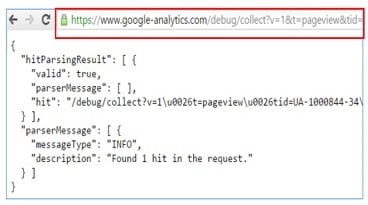Understanding measurement protocol validation server
Last Updated: September 5, 2023
This article is related to measurement protocol in Google Analytics.
If you are brand new to measurement protocol, then read this article first: Understanding Google Analytics measurement protocol.
In this article, I will show you, how to validate protocol hits by sending them to the measurement protocol validation server. You can access the validation server via:
- your application (program)
- Google measurement protocol hit builder tool
- Postman chrome extension
To access the validation server directly use the /debug/collect endpoint. Through this endpoint you can send hit data to the measurement protocol validation server instead of the GA server.
For example:
User-Agent: Mozilla/5.0 (Windows NT 6.3; WOW64) AppleWebKit/537.36 (KHTML, like Gecko) Chrome/30.0.1599.69 Safari/537.36
POST https://www.google-analytics.com/debug/collect?v=1&t=pageview&tid=UA-1029844-34&cid=c461d1ba-d341-499f-bc9e-673b67f2aa18&dh=mydemo.com&dp=%2Fhome&dt=testing%20page%20tracking
Understanding responses from Validation Server
When you send a hit to the measurement protocol validation server, the server will send you a response but that response will be in JSON format.
JSON, or JavaScript Object Notation, is a language-independent and lightweight data exchange format, which is used to store and exchange data.
Following is an example of a response from measurement protocol validation server:
{
“hitParsingResult“: [ {
“valid”: true,
“parserMessage“: [ ],
“hit“: “/debug/collect?v=1\u0026t=pageview\u0026tid=UA-1009844-34\u0026cid=c461d1ba-d341-499f-bc9e-673b67f2aa18\u0026dh=mydemo.com\u0026dp=%2Fhome\u0026dt=testing%20page%20tracking”
} ],
“parserMessage”: [ {
“messageType”: “INFO”,
“description”: “Found 1 hit in the request.”
} ]
}
Here hitParsingResult is an array and ‘valid‘, ‘parserMessage‘ and ‘hit‘ are the objects of this array.
Here the value of ‘valid‘ key is ‘true’. That means the hit is valid.
If the value of ‘valid’ key was ‘false’ then it would have meant the hit is invalid.
When a hit is invalid, you can then get more details about the error through following parserMessage keys:
- messageType
- description
- messageCode
- parameter
For example, following is a response from measurement protocol validation server for an invalid hit:
{
“hitParsingResult”: [ {
“valid”: false,
“parserMessage”: [ {
“messageType”: “ERROR“,
“description“: “The value provided for parameter ‘tid’ is invalid. Please see http://goo.gl/a8d4RP#tid for details.”,
“messageCode“: “VALUE_INVALID”,
“parameter”: “tid”
} ],
“hit”: “/debug/collect?v=1\u0026t=pageview\u0026t=event\u0026tid=1000844-34\u0026cid=c461d1ba-d341-499f-bc9e-673b67f2aa18\u0026dp=%2Fhome\u0026dt=testing%20page%20tracking”
} ],
“parserMessage”: [ {
“messageType”: “INFO”,
“description”: “Found 1 hit in the request.”
} ]
}
Here the value of the ‘valid’ key is false and the value of the ‘messageType’ is ‘ERROR’. From these two values, we can conclude that the hit is invalid.
In order to get more details about the nature of the error, look at the values of various ‘parserMessage’ keys: ‘description’, ‘messageCode’, and ‘parameter’.
From the ‘description’ key, we can conclude that, the value provided for parameter ‘tid’ in the payload data is invalid and because of this reason, the hit is invalid. If we provide the correct value for the ‘tid’ parameter, then the hit will become valid.
This is the kind of insight you can get, by reading the responses from the validation server.
Note: If you are sending hits to the validation server then they won’t show up in your Google Analytics reports.
The easiest way to view the response sent by the measurement protocol validation server is by copy-pasting the transport and payload data into the address bar of your browser window:

Here, I have copy-pasted the following transport and payload data into the address bar of my browser window:
https://www.google-analytics.com/debug/collect?v=1&t=pageview&tid=UA-1000844-34&cid=c461d1ba-d341-499f-bc9e-673b67f2aa18&dh=mydemo.com&dp=%2Fhome&dt=testing%20page%20tracking
Other articles on measurement protocol
- Sending pageview data via measurement protocol in Google Analytics
- Sending campaign data via measurement protocol in Google Analytics
- Sending event data via measurement protocol in Google Analytics
- Sending ecommerce data via measurement protocol in Google Analytics
- Sending social interactions via measurement protocol in Google Analytics
- Creating and validating measurement protocol requests through postman
Last Updated: September 5, 2023
This article is related to measurement protocol in Google Analytics.
If you are brand new to measurement protocol, then read this article first: Understanding Google Analytics measurement protocol.
In this article, I will show you, how to validate protocol hits by sending them to the measurement protocol validation server. You can access the validation server via:
- your application (program)
- Google measurement protocol hit builder tool
- Postman chrome extension
To access the validation server directly use the /debug/collect endpoint. Through this endpoint you can send hit data to the measurement protocol validation server instead of the GA server.
For example:
User-Agent: Mozilla/5.0 (Windows NT 6.3; WOW64) AppleWebKit/537.36 (KHTML, like Gecko) Chrome/30.0.1599.69 Safari/537.36
POST https://www.google-analytics.com/debug/collect?v=1&t=pageview&tid=UA-1029844-34&cid=c461d1ba-d341-499f-bc9e-673b67f2aa18&dh=mydemo.com&dp=%2Fhome&dt=testing%20page%20tracking
Understanding responses from Validation Server
When you send a hit to the measurement protocol validation server, the server will send you a response but that response will be in JSON format.
JSON, or JavaScript Object Notation, is a language-independent and lightweight data exchange format, which is used to store and exchange data.
Following is an example of a response from measurement protocol validation server:
{
“hitParsingResult“: [ {
“valid”: true,
“parserMessage“: [ ],
“hit“: “/debug/collect?v=1\u0026t=pageview\u0026tid=UA-1009844-34\u0026cid=c461d1ba-d341-499f-bc9e-673b67f2aa18\u0026dh=mydemo.com\u0026dp=%2Fhome\u0026dt=testing%20page%20tracking”
} ],
“parserMessage”: [ {
“messageType”: “INFO”,
“description”: “Found 1 hit in the request.”
} ]
}
Here hitParsingResult is an array and ‘valid‘, ‘parserMessage‘ and ‘hit‘ are the objects of this array.
Here the value of ‘valid‘ key is ‘true’. That means the hit is valid.
If the value of ‘valid’ key was ‘false’ then it would have meant the hit is invalid.
When a hit is invalid, you can then get more details about the error through following parserMessage keys:
- messageType
- description
- messageCode
- parameter
For example, following is a response from measurement protocol validation server for an invalid hit:
{
“hitParsingResult”: [ {
“valid”: false,
“parserMessage”: [ {
“messageType”: “ERROR“,
“description“: “The value provided for parameter ‘tid’ is invalid. Please see http://goo.gl/a8d4RP#tid for details.”,
“messageCode“: “VALUE_INVALID”,
“parameter”: “tid”
} ],
“hit”: “/debug/collect?v=1\u0026t=pageview\u0026t=event\u0026tid=1000844-34\u0026cid=c461d1ba-d341-499f-bc9e-673b67f2aa18\u0026dp=%2Fhome\u0026dt=testing%20page%20tracking”
} ],
“parserMessage”: [ {
“messageType”: “INFO”,
“description”: “Found 1 hit in the request.”
} ]
}
Here the value of the ‘valid’ key is false and the value of the ‘messageType’ is ‘ERROR’. From these two values, we can conclude that the hit is invalid.
In order to get more details about the nature of the error, look at the values of various ‘parserMessage’ keys: ‘description’, ‘messageCode’, and ‘parameter’.
From the ‘description’ key, we can conclude that, the value provided for parameter ‘tid’ in the payload data is invalid and because of this reason, the hit is invalid. If we provide the correct value for the ‘tid’ parameter, then the hit will become valid.
This is the kind of insight you can get, by reading the responses from the validation server.
Note: If you are sending hits to the validation server then they won’t show up in your Google Analytics reports.
The easiest way to view the response sent by the measurement protocol validation server is by copy-pasting the transport and payload data into the address bar of your browser window:

Here, I have copy-pasted the following transport and payload data into the address bar of my browser window:
https://www.google-analytics.com/debug/collect?v=1&t=pageview&tid=UA-1000844-34&cid=c461d1ba-d341-499f-bc9e-673b67f2aa18&dh=mydemo.com&dp=%2Fhome&dt=testing%20page%20tracking
Other articles on measurement protocol
- Sending pageview data via measurement protocol in Google Analytics
- Sending campaign data via measurement protocol in Google Analytics
- Sending event data via measurement protocol in Google Analytics
- Sending ecommerce data via measurement protocol in Google Analytics
- Sending social interactions via measurement protocol in Google Analytics
- Creating and validating measurement protocol requests through postman
My best selling books on Digital Analytics and Conversion Optimization
Maths and Stats for Web Analytics and Conversion Optimization
This expert guide will teach you how to leverage the knowledge of maths and statistics in order to accurately interpret data and take actions, which can quickly improve the bottom-line of your online business.
Master the Essentials of Email Marketing Analytics
This book focuses solely on the ‘analytics’ that power your email marketing optimization program and will help you dramatically reduce your cost per acquisition and increase marketing ROI by tracking the performance of the various KPIs and metrics used for email marketing.
Attribution Modelling in Google Analytics and BeyondSECOND EDITION OUT NOW!
Attribution modelling is the process of determining the most effective marketing channels for investment. This book has been written to help you implement attribution modelling. It will teach you how to leverage the knowledge of attribution modelling in order to allocate marketing budget and understand buying behaviour.
Attribution Modelling in Google Ads and Facebook
This book has been written to help you implement attribution modelling in Google Ads (Google AdWords) and Facebook. It will teach you, how to leverage the knowledge of attribution modelling in order to understand the customer purchasing journey and determine the most effective marketing channels for investment.







